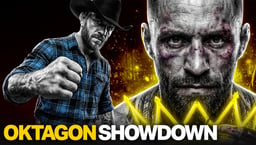
Issue 062
May 2010
I’m in a bit of an awkward situation – I feel like my loyalty is being tested. You see, I’ve been a loyal customer of a certain company for the last ten years. In that time I’ve invested a lot of energy (not to mention money) into staying abreast of the latest developments, but I just can’t do it any more – they demand too much. The constant new releases, updates and so on – it’s all just too much effort.
Forgive me, but I don’t mean MMA – I’m on about computers. I’m a PC user, and have been for as long as I can remember, but I’m seriously considering buying a Mac. You’re probably wondering what the hell has this got to do with fighting. Well, it just so happens that the whole Microsoft / Apple thing got me thinking.
Microsoft and Apple are two of the most well-known companies in the world. They dominate computing, and you’ve only really got two choices if you’re thinking of buying something to check your email with. Do you go for a nice white Apple Mac or one of those family-friendly PC towers that sit under office desks all over the planet? It’s not so much about the products – it’s as much about the brand. Fans of each will defend them with a fervor that people usually reserve for sports teams.
Both companies are gigantic. Both generate billions of dollars in revenue, and co-exist (mostly) harmoniously in a very competitive market.
So considering the case of Microsoft and Apple, who can work peacefully side-by-side in a cutthroat industry, is there any way a company could share the global MMA market with the UFC?
At present, there isn’t exactly a lot of choice for followers of MMA. Aside from the UFC, there are no major multinational MMA promotions. Strikeforce hold the title of second best in the US, but there are no companies that come close to enjoying the same level of exposure (and income) as the UFC.
Dana White has said a number of times how they want to develop their brand to the point that it becomes the sport. Right now, the UFC is just a brand, and ‘ultimate fighting’ is its product. But the UFC simply is MMA to many fans.
It was the first mixed martial arts promotion in North America, and the original owners unwittingly created an insanely strong brand at the same time as devising their product. By slapping the three initials on the spectacle of two men duking it out in a cage, they forged an association in people’s minds. Whether you were a fan or not, the letters ‘UFC’ stood for one thing, and one thing only. Dana White recognized not only the burgeoning potential of the sport of MMA, but also the amazing power in the UFC brand – why else would he persuade the Fertitta brothers to shell out for a dying promotion? They could just have easily started their own, but the power of the brand was irresistible.
Consider the UFC’s success for a minute – the way the company has exploded in the last couple of years is obviously attractive enough to inspire others to try their hand at promoting MMA too. The last few years saw a rash of start-ups, from EliteXC to the IFL and Affliction. How many remain? Exactly.
The UFC benefits from resources that others do not. Who else could have operated for almost five years and racked up over $40million in debt before finally hitting the big time? The structure of the company and the people who drive it forward, not to mention the fighters under contract – the UFC really is in a league of its own.
Strikeforce is a little different in that it has experienced promoters – it’s been putting on kickboxing events since the mid-‘90s – and it’s not overstretching itself like some of the casualties of recent years. At the moment I doubt it’ll ever reach the same dizzy heights as the UFC, but if you think back ten years where was Apple compared to Microsoft? Bill Gates’ company seemed unassailable – its grip on the market was incredible, vast beyond comprehension. That another company might challenge it was just beyond the realms of imagination.
Although they share a common bond, Apple and Microsoft are two very different companies. As such they have each created their own niche and specialized in offering a certain experience to their customers. Ultimately this is what all big brands must do to survive – if you want your customers to remain loyal to you and not suddenly decide to support your competitor, you must give them something nobody else can.
I believe this is the only hope for companies such as Strikeforce to even consider matching the UFC at its own game. There’s no guarantee anyone will ever match the UFC, and there’s as good a chance it could be another company as, say, Strikeforce, but in this case the comparison works.
There are many other brands that share a market with a major competitor: Coca-Cola and Pepsi, Levi and Wrangler, Ford and General Motors. It’s not that one product is better than the other, but the power that a brand has to draw-in customers is remarkable. For now, the UFC has the best product and the best brand, but should someone create a product that can match that of the UFC, it will come down to brand loyalty.
...









